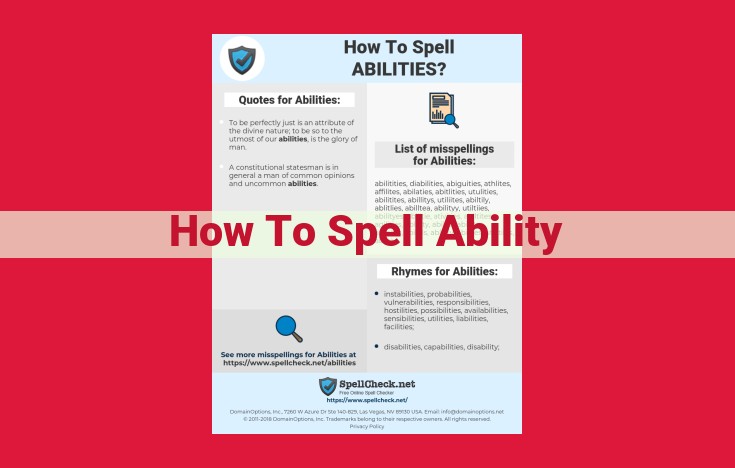Spelling ability involves cognitive functions like working memory, phonological awareness, and orthographic memory, which interact to process and store spelling information. Essential skills include letter-sound correspondence, blending, segmenting, and decoding. Effective instruction methods include explicit phonics, phonemic awareness, and multisensory approaches, which target different cognitive and linguistic processes involved in spelling.
The Cognitive Cornerstones of Spelling Prowess: Unlocking the Secrets of Spelling Success
Every time you effortlessly scribble down a word, a whirlwind of cognitive processes dance behind the scenes, orchestrating the symphony of spelling. To become a spelling virtuoso, it’s essential to understand these cognitive functions that lay the foundation for accurate and fluent spelling.
At the heart of spelling ability lies working memory, the mental scratchpad that temporarily stores and manipulates information. Like a juggling circus, working memory keeps track of the sequence of letters in a word, allowing you to rehearse and spell it correctly.
Phonological awareness, the ability to recognize and manipulate the sounds of language, is another crucial player. Imagine spelling the word “cat.” Your brain breaks down the word into its individual sounds (/k/-/a/-/t/) and matches each sound to its corresponding letters.
Lastly, orthographic memory acts as a dictionary in your brain, storing the visual representation of words. When you encounter a word you’ve seen before, orthographic memory retrieves its visual form, guiding your fingers to write it down.
These cognitive functions work in concert like a well-oiled machine. Working memory holds the word’s sequence, phonological awareness converts sounds to letters, and orthographic memory cues the correct spelling pattern. Together, they form an indispensable triad for spelling proficiency.
Skills Crucial for Effective Spelling
Spelling is a complex skill that draws on a range of cognitive abilities. At its core, proficient spelling relies on a foundation of key skills that enable us to accurately and efficiently transform spoken words into written form.
One such skill is letter-sound correspondence. This refers to our ability to recognize the relationship between the letters we see and the sounds they represent. It’s the bedrock of spelling, as it allows us to translate the individual units of speech into their corresponding written symbols.
Next comes the crucial skill of blending. By effortlessly merging individual sounds together, we can synthesize whole words from their constituent parts. This ability is essential for accurately reproducing spoken language in written form.
Segmenting, on the other hand, involves breaking down words into their individual sounds. This skill is just as important as blending, as it allows us to analyze words and identify the sound units that need to be represented in writing.
Finally, decoding plays a vital role in spelling proficiency. Decoding refers to the process of transforming written words into their corresponding sounds. This skill enables us to read unfamiliar words and understand their pronunciation, which in turn aids our spelling.
The interplay of these key skills is essential for developing accurate and efficient spelling strategies. By mastering letter-sound correspondence, blending, segmenting, and decoding, we lay the foundation for proficient spelling, empowering us to communicate effectively through the written word.
Effective Methods of Spelling Instruction
1. Orton-Gillingham Approach
*Rationale: _Focuses on multi-sensory learning, targeting auditory, visual, and kinesthetic pathways._
*Benefits: _Improves letter recognition, letter-sound correspondence, and word decoding skills._
*Implementation: _Uses a structured, sequential program that incorporates hands-on activities, such as tracing letters in sand or clay._
2. Multisensory Structured Language (MSL) Approach
*Rationale: _Similar to Orton-Gillingham, MSL emphasizes a multi-sensory approach to language instruction._
*Benefits: _Supports students with language-based learning difficulties, including dyslexia._
*Implementation: _Involves a combination of auditory, visual, kinesthetic, and tactile activities to enhance word recognition, spelling, and language comprehension._
3. Phonological Awareness Training
*Rationale: _Focuses on the ability to manipulate and identify sounds in words._
*Benefits: _Strengthens letter-sound correspondence and decoding skills, foundational for spelling accuracy._
*Implementation: _Includes games and activities that involve rhyming, blending, segmenting, and manipulating sounds._
4. Spelling Mnemonics
*Rationale: _Utilizes memory tricks and strategies to aid in remembering spelling patterns._
*Benefits: _Provides visual, auditory, and kinesthetic cues to enhance word retention._
*Implementation: _Involves creating rhymes, stories, or visual representations to associate with difficult spellings._
5. Tech-Enhanced Spelling Programs
*Rationale: _Leverages technology to provide interactive and adaptive spelling practice._
*Benefits: _Offers personalized feedback, individualized instruction, and engaging activities._
*Implementation: _May involve online platforms, mobile apps, or software that track progress and adjust content based on student performance._
6. Word Study
*Rationale: _Examines word patterns, structures, and etymology to deepen understanding of spelling rules._
*Benefits: _Promotes a deeper comprehension of spelling and vocabulary._
*Implementation: _Involves activities such as analyzing root words, affixes, and comparing words with similar patterns._
Remember, effective spelling instruction should be tailored to the individual learner’s needs and learning style. By incorporating these methods into your教学方法, you can equip students with the cognitive skills and strategies essential for spelling proficiency.
